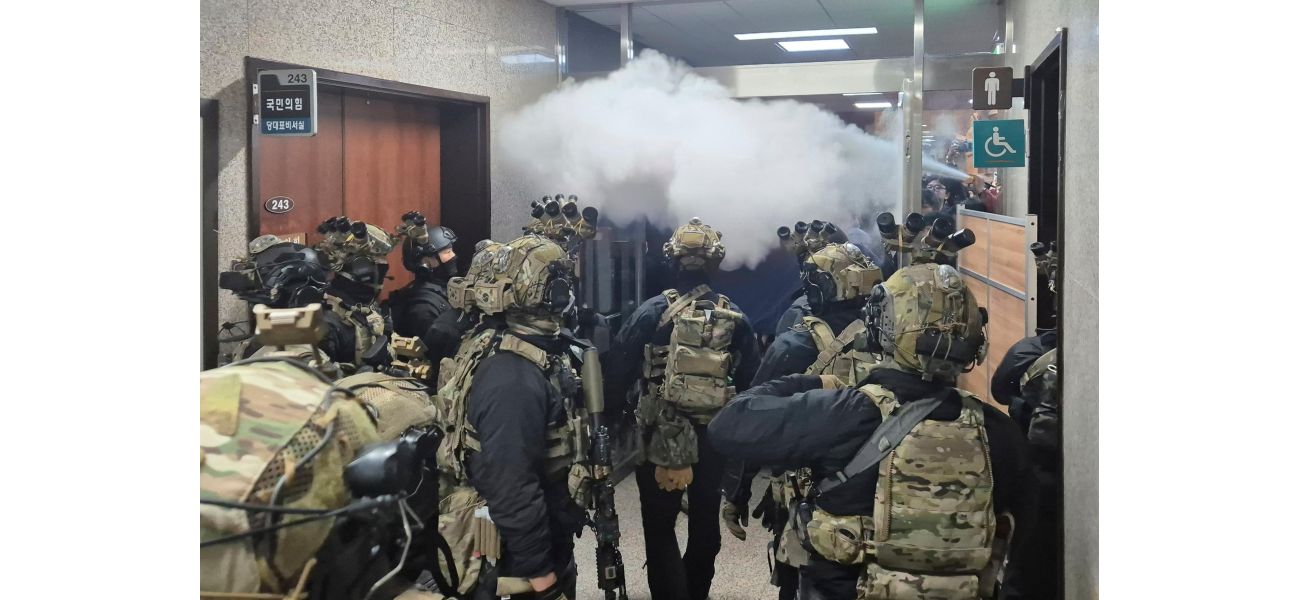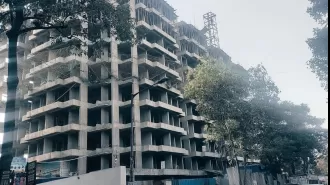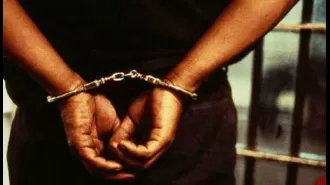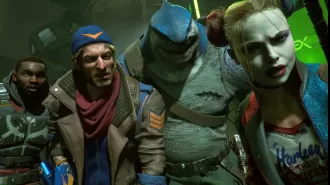Calls for South Korean leader to step down or face impeachment for implementing abrupt martial law.
South Korea's opposition party demands President Yoon Suk Yeol's resignation after he ended short-lived martial law that encircled parliament.
December 4th 2024.

On a cold December morning, in the bustling city of Seoul, South Korea, there was a sense of confusion and disbelief as citizens tried to make sense of the events that had transpired overnight. President Yoon Suk Yeol, in a desperate attempt to push forward his agenda in the opposition-dominated parliament, had declared a state of emergency and imposed martial law. This move, however, was met with quick opposition and the National Assembly voted to overrule the president, effectively lifting the martial law just six hours after it was declared.
The liberal opposition Democratic Party, which holds a majority in the parliament, wasted no time in calling for Yoon's resignation, stating that his martial law declaration was a blatant violation of the constitution. They even went as far as to threaten impeachment if he did not step down voluntarily. Impeaching the president would require the support of two-thirds of the parliament, a feat that seemed achievable as the Democratic Party and other small opposition parties together held 192 seats.
Even members of Yoon's own ruling People Power Party were in opposition to his actions. Han Dong-hun, the party's leader, who had a longstanding relationship with Yoon, publicly criticized the martial law declaration as being unconstitutional. If Yoon were to be impeached, he would be stripped of his powers until the Constitutional Court could rule on his fate. In the meantime, Prime Minister Han Duck-soo would take over his presidential responsibilities.
As the calls for Yoon's resignation grew louder, Prime Minister Han issued a plea for patience, urging Cabinet members to continue fulfilling their duties. This was a tumultuous time for South Korea, as scenes of military intervention, which had not been seen since the country achieved democracy in the late 1980s, played out on the streets. Soldiers, tanks, and armed vehicles were deployed to prevent anti-government demonstrations, while military helicopters flew overhead.
However, the opposition was determined to resist Yoon's actions. Opposition leader Lee Jae-myung even livestreamed himself climbing over a wall to enter the parliamentary hall where the vote to lift the martial law was taking place. Although troops and police officers attempted to block some protesters from entering, they did not use force or aggression against them.
In the end, the parliamentary vote to lift the martial law was successful, and the troops and police personnel were seen leaving the grounds of the National Assembly. National Assembly Speaker Woo Won Shik commended the maturity of the military in handling the situation and stated that the citizens had witnessed a peaceful resolution to the events of that day.
As the dust settled, many were left questioning Yoon's decision and the recommendation of Defense Minister Kim Yong Hyun, who had suggested the martial law decree. Under South Korea's constitution, the president can only declare martial law in times of war or other national emergencies that require the use of military force to maintain order. Many were left wondering if the country was truly in such a state.
In the end, the events of that day were a reminder of South Korea's past, when military-backed governments would often declare martial law to suppress opposition and maintain control. But for now, the country could breathe a sigh of relief as peace and order were restored.
The president of South Korea, Yoon Suk Yeol, faced immense pressure on Wednesday as the main opposition party called for his resignation or possible impeachment. This came after Yoon imposed a martial law, which was quickly lifted after the National Assembly overruled it through a vote. The capital city of Seoul seemed to return to its usual hustle and bustle, with tourists and residents going about their day and the only noticeable difference being the presence of police.
The emergency martial law was declared by Yoon on Tuesday night, with the intention of eliminating any anti-state forces that may hinder his agenda in the opposition-dominated parliament. However, the declaration was short-lived and lasted only about six hours, as the National Assembly quickly voted to reject it. The liberal opposition Democratic Party, which holds the majority in the parliament, issued a statement calling the martial law declaration a violation of the constitution and urging for Yoon's resignation or impeachment.
Impeaching Yoon would require the support of two-thirds of the parliament, which the opposition party and other small parties do not currently have. However, 18 members from Yoon's ruling People Power Party voted against the martial law declaration, showing a divide within the ruling party. The leader of the People Power Party, Han Dong-hun, who has a long history with Yoon, criticized the martial law declaration as unconstitutional. If Yoon were to be impeached, his powers would be temporarily stripped until the Constitutional Court makes a ruling. In the meantime, Prime Minister Han Duck-soo would take over his presidential responsibilities.
Yoon's martial law declaration brought back memories of South Korea's past military-backed governments, where martial law was occasionally declared to suppress anti-government demonstrations. However, this was the first time such a declaration had been made in over 40 years since the country achieved democracy in the late 1980s. Troops and police were seen on the streets and around the National Assembly building, and there were reports of a soldier pointing his assault rifle at a protester. However, no major violence was reported and the troops and police left the area after the parliamentary vote to lift the martial law.
It remains unclear how the 190 lawmakers were able to enter the parliamentary hall to vote down the martial law declaration, as some were seen climbing over walls and others were blocked by troops and police. The opposition leader, Lee Jae-myung, livestreamed himself climbing over the wall and noted that while some were stopped, there was no use of force to restrain them. The National Assembly Speaker, Woo Won Shik, praised the maturity of the military during this time.
The leader of the ruling party, Han Dong-hun, demanded an explanation from Yoon and called for the dismissal of Defense Minister Kim Yong Hyun, who is said to have recommended the martial law declaration. Yoon has not commented on this matter. According to South Korea's constitution, a president can declare martial law during wartime or a national emergency that requires the use of military force to maintain order. However, many are questioning if the current situation in South Korea meets these criteria.
The liberal opposition Democratic Party, which holds a majority in the parliament, wasted no time in calling for Yoon's resignation, stating that his martial law declaration was a blatant violation of the constitution. They even went as far as to threaten impeachment if he did not step down voluntarily. Impeaching the president would require the support of two-thirds of the parliament, a feat that seemed achievable as the Democratic Party and other small opposition parties together held 192 seats.
Even members of Yoon's own ruling People Power Party were in opposition to his actions. Han Dong-hun, the party's leader, who had a longstanding relationship with Yoon, publicly criticized the martial law declaration as being unconstitutional. If Yoon were to be impeached, he would be stripped of his powers until the Constitutional Court could rule on his fate. In the meantime, Prime Minister Han Duck-soo would take over his presidential responsibilities.
As the calls for Yoon's resignation grew louder, Prime Minister Han issued a plea for patience, urging Cabinet members to continue fulfilling their duties. This was a tumultuous time for South Korea, as scenes of military intervention, which had not been seen since the country achieved democracy in the late 1980s, played out on the streets. Soldiers, tanks, and armed vehicles were deployed to prevent anti-government demonstrations, while military helicopters flew overhead.
However, the opposition was determined to resist Yoon's actions. Opposition leader Lee Jae-myung even livestreamed himself climbing over a wall to enter the parliamentary hall where the vote to lift the martial law was taking place. Although troops and police officers attempted to block some protesters from entering, they did not use force or aggression against them.
In the end, the parliamentary vote to lift the martial law was successful, and the troops and police personnel were seen leaving the grounds of the National Assembly. National Assembly Speaker Woo Won Shik commended the maturity of the military in handling the situation and stated that the citizens had witnessed a peaceful resolution to the events of that day.
As the dust settled, many were left questioning Yoon's decision and the recommendation of Defense Minister Kim Yong Hyun, who had suggested the martial law decree. Under South Korea's constitution, the president can only declare martial law in times of war or other national emergencies that require the use of military force to maintain order. Many were left wondering if the country was truly in such a state.
In the end, the events of that day were a reminder of South Korea's past, when military-backed governments would often declare martial law to suppress opposition and maintain control. But for now, the country could breathe a sigh of relief as peace and order were restored.
The president of South Korea, Yoon Suk Yeol, faced immense pressure on Wednesday as the main opposition party called for his resignation or possible impeachment. This came after Yoon imposed a martial law, which was quickly lifted after the National Assembly overruled it through a vote. The capital city of Seoul seemed to return to its usual hustle and bustle, with tourists and residents going about their day and the only noticeable difference being the presence of police.
The emergency martial law was declared by Yoon on Tuesday night, with the intention of eliminating any anti-state forces that may hinder his agenda in the opposition-dominated parliament. However, the declaration was short-lived and lasted only about six hours, as the National Assembly quickly voted to reject it. The liberal opposition Democratic Party, which holds the majority in the parliament, issued a statement calling the martial law declaration a violation of the constitution and urging for Yoon's resignation or impeachment.
Impeaching Yoon would require the support of two-thirds of the parliament, which the opposition party and other small parties do not currently have. However, 18 members from Yoon's ruling People Power Party voted against the martial law declaration, showing a divide within the ruling party. The leader of the People Power Party, Han Dong-hun, who has a long history with Yoon, criticized the martial law declaration as unconstitutional. If Yoon were to be impeached, his powers would be temporarily stripped until the Constitutional Court makes a ruling. In the meantime, Prime Minister Han Duck-soo would take over his presidential responsibilities.
Yoon's martial law declaration brought back memories of South Korea's past military-backed governments, where martial law was occasionally declared to suppress anti-government demonstrations. However, this was the first time such a declaration had been made in over 40 years since the country achieved democracy in the late 1980s. Troops and police were seen on the streets and around the National Assembly building, and there were reports of a soldier pointing his assault rifle at a protester. However, no major violence was reported and the troops and police left the area after the parliamentary vote to lift the martial law.
It remains unclear how the 190 lawmakers were able to enter the parliamentary hall to vote down the martial law declaration, as some were seen climbing over walls and others were blocked by troops and police. The opposition leader, Lee Jae-myung, livestreamed himself climbing over the wall and noted that while some were stopped, there was no use of force to restrain them. The National Assembly Speaker, Woo Won Shik, praised the maturity of the military during this time.
The leader of the ruling party, Han Dong-hun, demanded an explanation from Yoon and called for the dismissal of Defense Minister Kim Yong Hyun, who is said to have recommended the martial law declaration. Yoon has not commented on this matter. According to South Korea's constitution, a president can declare martial law during wartime or a national emergency that requires the use of military force to maintain order. However, many are questioning if the current situation in South Korea meets these criteria.
[This article has been trending online recently and has been generated with AI. Your feed is customized.]
[Generative AI is experimental.]
0
0
Submit Comment





